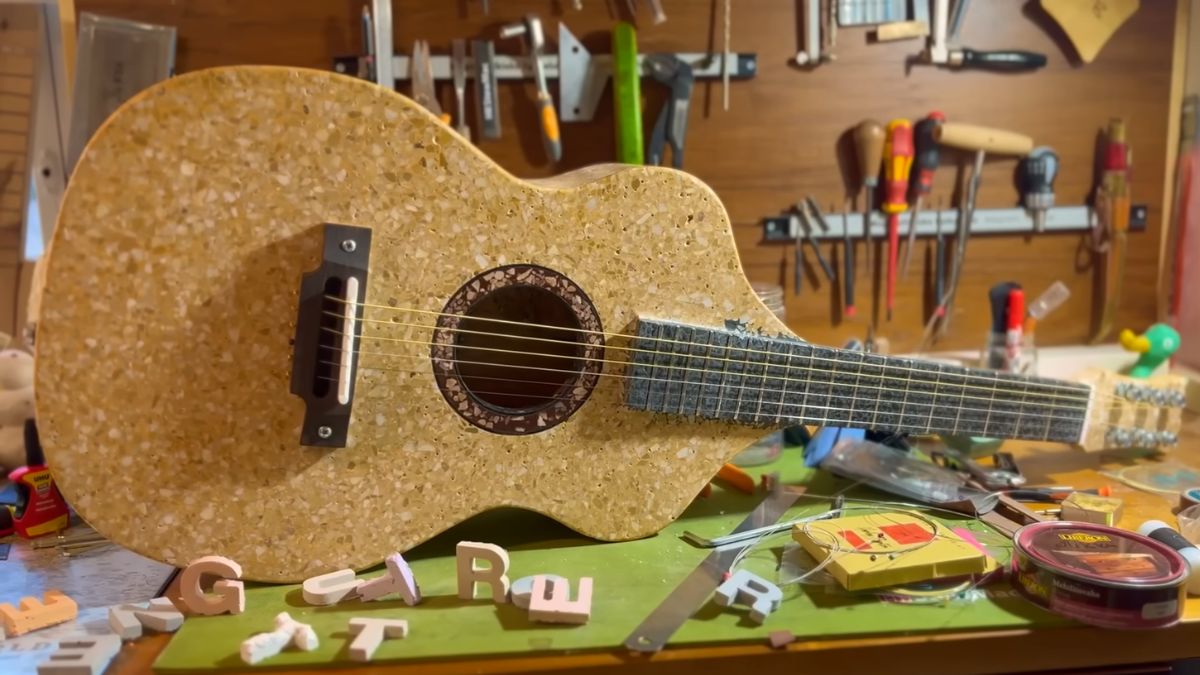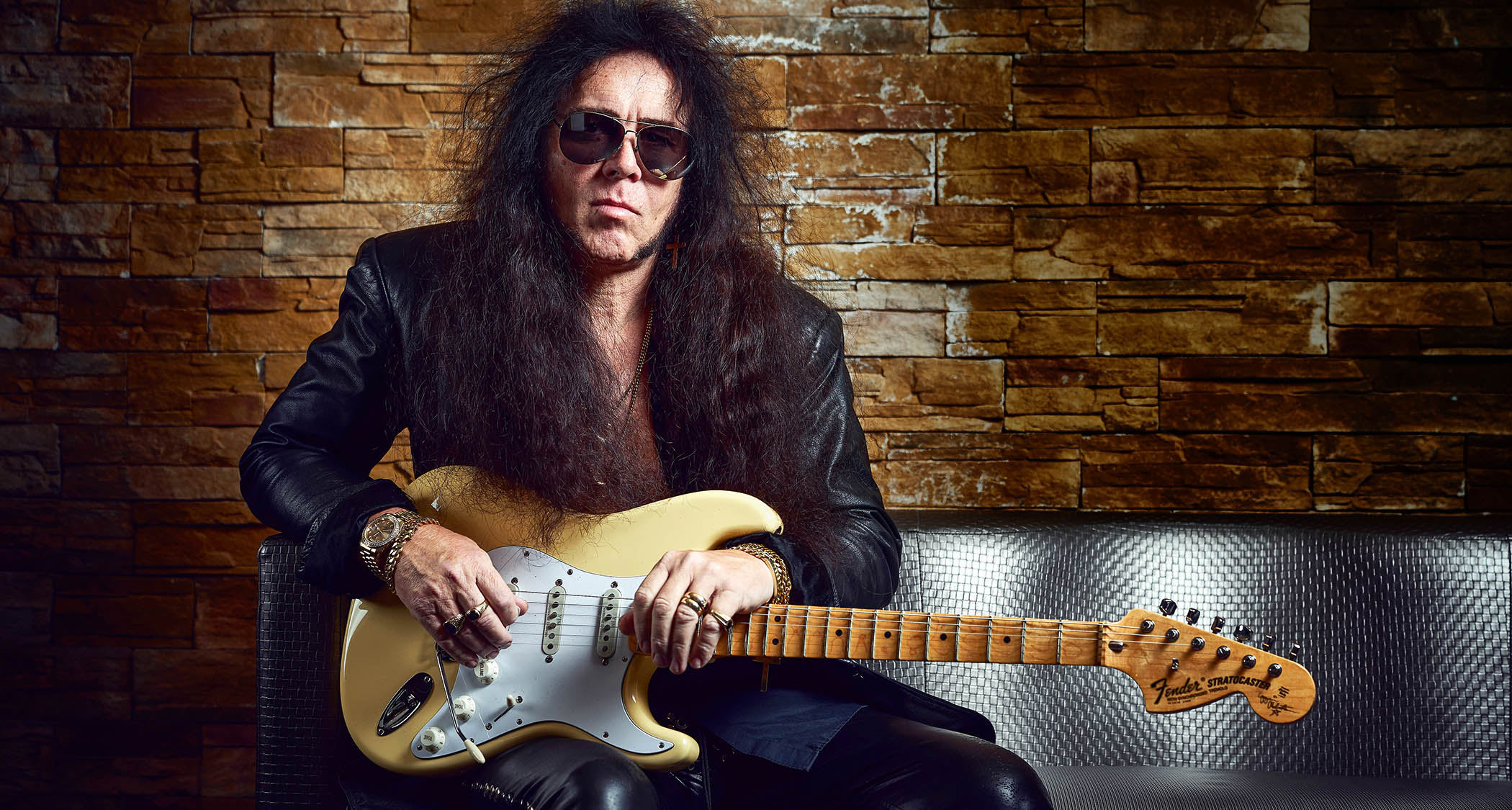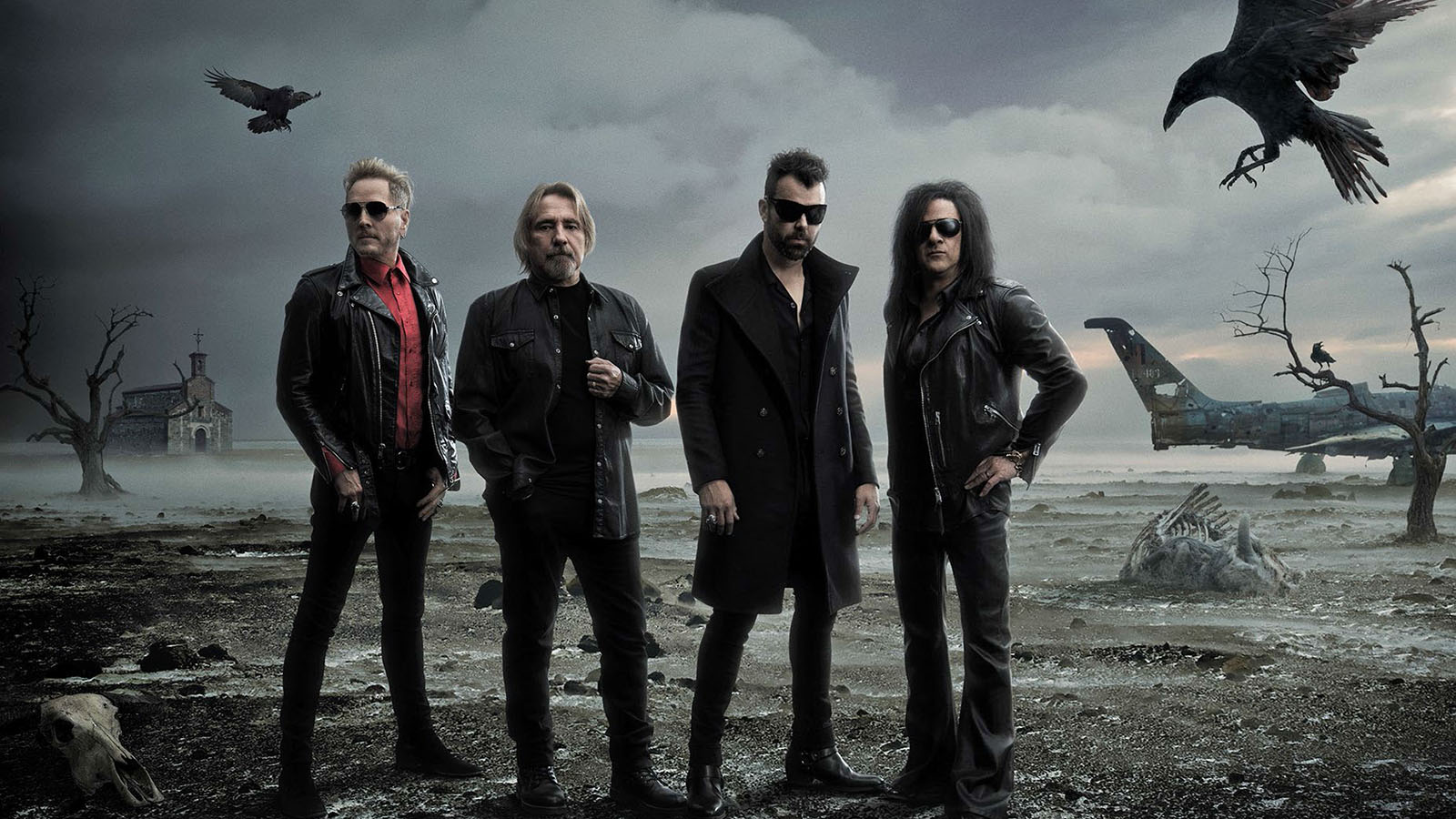
Geezer Butler and Steve Stevens want to make one thing clear: Don’t even think of calling Deadland Ritual — the new band they recently formed with drummer Matt Sorum (formerly of Guns N’ Roses and Velvet Revolver) and singer Franky Perez (of Apocalyptica and formerly of Scars on Broadway) — a “supergroup.” They’re having none of that.
“It’s kind of a passé term, isn’t it?” Butler asks rhetorically. “Whenever I think of supergroups, I think of Eric Clapton and Jimi Hendrix — people of that caliber. Supergroups were kind of a Sixties or Seventies thing. We’re just four guys getting together and doing what we like.”
Stevens echoes Butler’s sentiments, saying, “We would never call ourselves a supergroup. I think anybody who uses that term is kind of setting themselves up for a fall, because the expectations will be so great that whatever you do will be judged so unfairly. What matters to me is what happened when we got together in this little rehearsal room. We looked at one another and said, ‘OK, do we have something here, or not?’ And immediately there was a chemistry. There was a shared vision, and we all felt a reason to do it.”
The origins of Deadland Ritual have their roots in two L.A.-based bands led by Sorum: Camp Freddy and Kings of Chaos, both of which featured a host of revolving high-wattage members and guest musicians that at various points featured Stevens and Perez. Stevens, on a break from his regular gig as guitarist and musical director for Billy Idol, was plotting a solo album with Perez as singer. “But then Franky said that he had been talking to Matt, and I thought it might be interesting for us all to work together,” he says. “The three of us had jammed with each other numerous times, so there was already a built-in comfort factor.”
The addition of Butler to the fold can be chalked up to timing and circumstance. After Black Sabbath played their last show in February 2017, the bassist and his wife spent the better part of the year traveling through Europe and America as tourists. “I wanted to spend time seeing all of the places I had only looked at through the windows of hotel rooms,” he says. Upon returning to his Los Angeles home, he quickly found himself bored and began writing songs for a solo album. “The only problem was, the guy I was working with moved to the East Coast, so I needed somebody to bounce ideas off of,” he explains. “It was kind of unfulfilling doing it all myself.”
Butler had remarked to a journalist that he was thinking of starting a new band, and once Sorum got wind of his intentions, he put in a call and asked the bassist if he’d be interested in joining forces. “We all met for dinner,” Stevens says, “and we realized that all four of us clicked. Then we got together to jam, and that was it — what a great sound. It was effortless. I was just looking around the room feeling excited about making music.”
Because of Stevens’ touring commitments with Billy Idol, Deadland Ritual have been able to track only a handful of songs — “Down in Flames,” “Broken and Bruised” and “Walking into Walls” — with producer Greg Fidelman (who had engineered Black Sabbath’s final album, 13). Once he wraps his current “duo” tour with Idol, he’ll reconvene with the band to complete their debut album, just in time for everybody to hit the festival circuit in Europe.
Get The Pick Newsletter
All the latest guitar news, interviews, lessons, reviews, deals and more, direct to your inbox!
According to the guitarist, one of the fringe benefits of working with players who share illustrious pedigrees is the stories that get tossed around during rehearsals. “Even though we come from different bands and eras, a lot of our escapades are so similar,” he says. “We’ll swap stories and go, ‘Oh, man, that happened to you, too?’ And it’s interesting what you discover, like how Geezer was sitting around listening to the Beatles in 1966, just like me and Matt were, only we did it a few years later and we were an ocean apart. So that’s been the great thing, finding how similar we all are.”
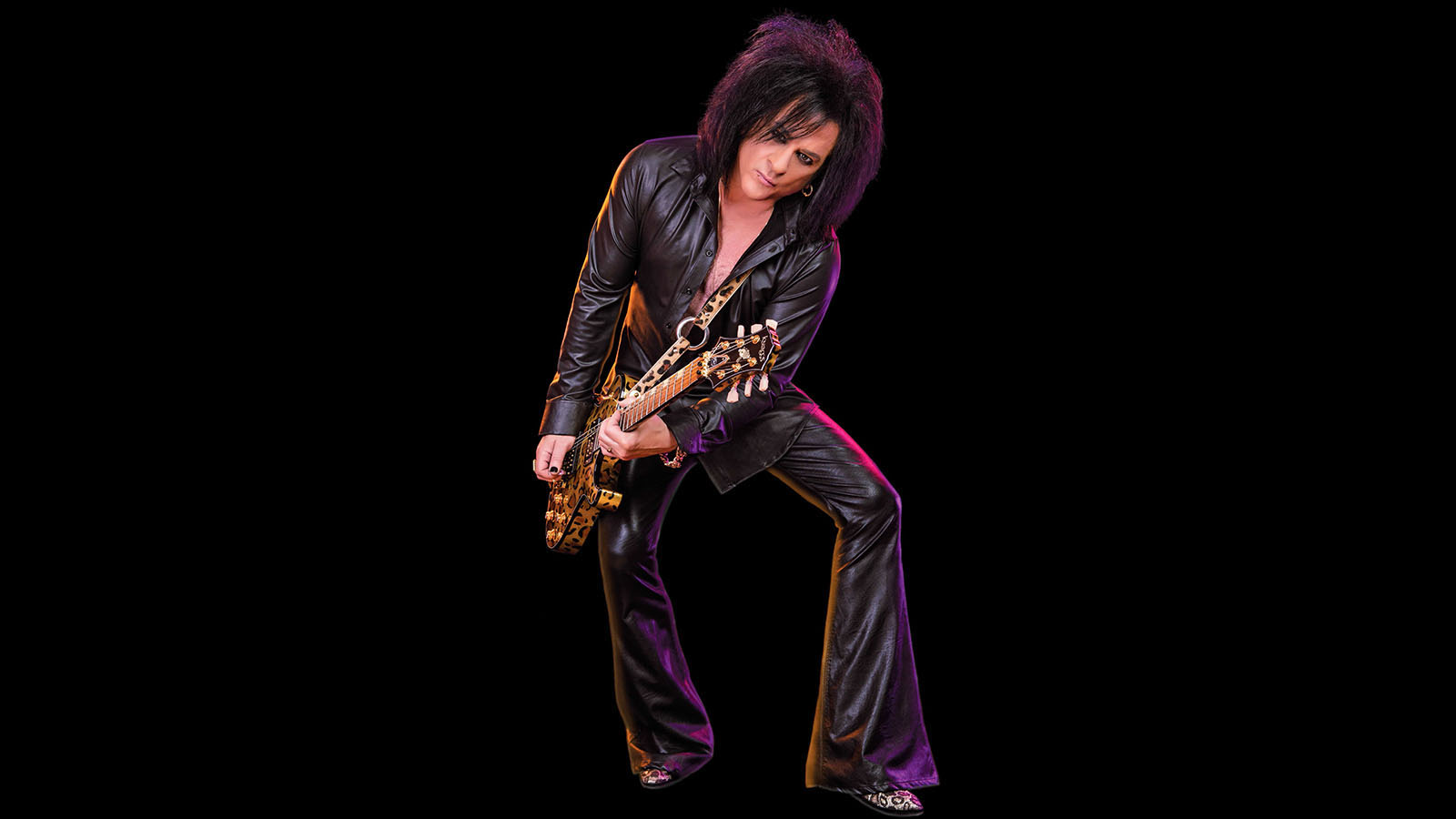
Steve, you had worked with Matt and Franky before, but Geezer was something of a wild card. Even though he’s “Geezer Butler from Black Sabbath,” there was no guarantee he would be the right bassist for the band.
STEVENS: No, there wasn’t, and if it didn’t work, it didn’t work. But I was hoping that it would, and it did. I knew I wanted a one-guitar band, so by design I wanted a bass player who created a big sound. And if there’s anybody who’s known for that, it’s Geezer. He has lots of experience playing with one guitarist, laying down a strong foundation, and that frees me up to kind of do anything I want guitar-wise. And it frees Geezer up to be Geezer! [Laughs] Plus, he’s a great songwriter, so I knew I could rely on him for riffs and arrangements and all that.
BUTLER: That’s something I have a lot of experience with: being the bassist for a one-guitar band. Steve and I forged a good thing in a short period of time. I’ll play him something, and then he’ll say yes or no to it. And if he likes it he’ll take it in a totally different direction to what I’d imagined. That’s what I was hoping for, really.
Geezer, when did you first become aware of Steve?
BUTLER: The first time I saw him was on The Tonight Show years ago. I wasn’t really aware of him before then, but when I saw him playing, I was like, “Who the hell is this guy?” I never thought I’d be working with him, but I recall thinking he was really innovative. He’s very different from anybody I’ve ever worked with.
Even though you guys are well known, starting a new band takes a lot of work. How committed are you to the project?
BUTLER: Oh, I’m totally committed, 100 percent.
STEVENS: Same here. Obviously, my history with Billy Idol is well founded, but I’ve always wanted a band, and I’m totally into this. It gives me an outlet to put out new music. I think my approach to the guitar in this band will show off some sides to my playing that a lot of people might not be familiar with, so I’m really excited about that.
BUTLER: Nobody expects this to be immediate. We have to go out and start off like a brand-new band that nobody’s ever heard. We’re starting off in clubs, something I haven’t done in God knows how many years. It’ll be fun.
Really? You won’t miss the first-class travel and all that?
BUTLER: No, I’m looking forward to it. There’s a different atmosphere playing in clubs than when you’re performing for 15,000 in a big arena.
Even though we’re not calling the band a “supergroup,” you are players with histories and, I assume, egos. Did you all discuss how you were going to make this work so that nobody’s ego got in the way?
BUTLER: This was discussed during our first meeting, when we sat in a restaurant in Hollywood and talked all of this through. We got on really well, and I could kind of tell right away that everybody was down to earth. The attitude thing you’re talking about doesn’t really exist in this band.
STEVENS: I think we’ve all worked with temperamental people, and we don’t want to be them. You have to sweat and persevere to make great music, and the only way to see it through is to be egoless. When we go into a dingy little rehearsal room, that’s all we’re thinking about. You can’t be a prima donna and make that happen.
Most of the time, somebody sets the agenda for the band. Do you have a de facto leader?
BUTLER: So far, it feels very democratic. But I think we all look to Matt as that guy. It’s sort of like, “OK, Matt, what do we do next?” [Laughs]
STEVENS: I think we all know what our strengths are. Matt has a very good business acumen, so he’s really crucial in doing a lot of the behind-the-scenes stuff, and he enjoys doing that. I’m not good at that. I have my home studio, and I’m happy to work on stuff and demo it. We try to concentrate on what we’re good at.
BUTLER: Matt came up with the name for the band.
I was going to ask, what does the name Deadland Ritual mean?
STEVENS: Deadland Ritual was something that Matt saw on an old Western poster. Picking a name isn’t so simple nowadays — everybody and their mother has a band name registered. You have to do your research and clear it. Back in 1964, when everybody started bands because of the Beatles, it was easy. You’d just pick a name and go with it. Things were wide open.
Is there a set approach to how you’ve been writing together?
BUTLER: The first two songs were written by Steve without me there, so those are what I heard, the demo versions. And then when I was part of the band, he and I got together and worked on more songs, and, of course, we got Franky and Matt involved.
STEVENS: Franky’s been sending song ideas, and he has one that’s kind of a dark ballad that we’re working on. I think everybody will contribute, and we’re honest with one another. There’s definitely a dark vibe to our stuff. I remember one idea I was working on, and I sent it to everybody. The response was, “Not dark enough.” So I listened back and went. “Yeah, you’re right.”
Steve, I notice a faint trace of prog in some of the arrangements. A lot of people don’t know what a big prog head you are.
STEVENS: I know! In some of the things we’re doing, my prog side is raising its head. When I come up with a song idea, I’ll demo it and send it off to Matt, and he’ll go, “Oh, all right, a little prog in there.” [Laughs] But it’s welcomed. Nobody’s going, “Oh, my God, no.” We’re not doing songs in 11/8, yet, but there’s little twists and turns that show off my love of prog.
“Broken and Bruised” is pretty tough sounding. Is that tuned down to D or C#?
STEVENS: Yeah, a lot of the stuff is tuned down.
You don’t do that kind of thing with Billy Idol, right?
STEVENS: No, I don’t, so it’s really cool to do it here. Tuning down is kind of tricky — you just can’t unwind your strings and expect everything to be perfect. So I had to have a guitar made specifically for me to do that. The people at Knaggs built me a Steve Stevens model with an EverTune bridge, which keeps things really stable. That guitar rang out just perfectly, and everything was perfectly in tune.
Of course, we should mention who helped pioneer the tuned-down guitar — Tony Iommi.
STEVENS: Of course!
BUTLER: Most of that came about accidentally because of Tony’s fingers. He had to tune down to get more of a grip on the strings with his plastic fingers. From there that became sort of our signature sound.
Speaking of which, “Down in Flames” has a riff that’s pretty Sabbath-y. Geezer, when the band plays that song, does everybody sort of stare at you?
BUTLER: [Laughs] I mean, not really. But Black Sabbath does seem to be the one band that everybody in this group likes, so I think a lot of the tracks have a Sabbath thing to them. It’s sort of there in the back of people’s minds.
STEVENS: I actually stumbled upon that riff a while ago, but it almost sounded like Hendrix to me. It’s weird — everybody hears something differently. But it definitely comes from the eras we like — the late Sixties and early Seventies.
“Walking into Walls” has a pretty wild, extended solo. Steve, are you going to go off a little more in the next batch of songs?
STEVENS: Could be. You know, it’s fun, obviously, but hopefully I don’t go off to the point where people feel compelled to hold up score cards or anything. I went a little crazy in that song because it fit. I know when to play and when not to play.
Steve, other than the Knaggs guitar that you had built for “Broken and Bruised,” what other axes are you using in the studio?
STEVENS: I used Knaggs for all of my electrics. I didn’t bring in 200 guitars or anything like that. For acoustics, I used Collings.
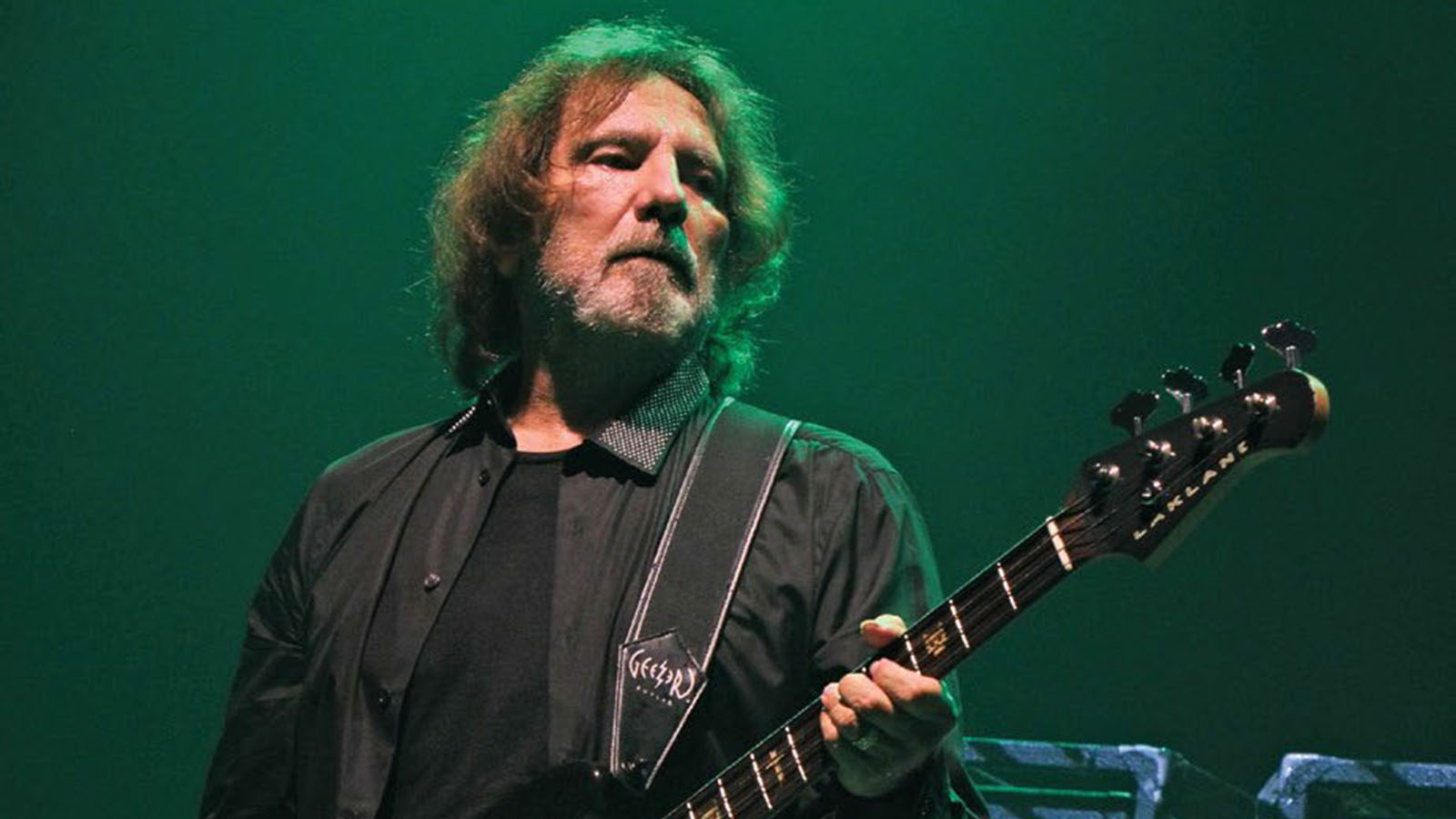
Geezer, what are you playing?
BUTLER: I play Lakland. They make a signature custom bass for me. That’s basically it.
What about amps?
STEVENS: I didn’t want to get hung up with too many choices; I wanted to take off my engineering hat, so I just brought in two amps — one of my Friedman SS amps and a Bogner Uberschall. But I also ended up playing through one of Greg’s amps, an Ampeg SV-4, which is a bass amp. He suggested it, and I thought he was crazy. Sure enough, I tried it and it sounded incredible. I never would have thought to use it.
BUTLER: I use the Ashdown Head of Doom — again, that’s my signature amp. Although I did use Greg’s Ampeg as well. Come to think of it, I used that on the Sabbath album I did with Greg. Yeah, that’s a good one.
And how about effects?
STEVENS: I didn’t use a big rack of stuff. I did use a Unique-Vibe, which is a replica of a Uni-Vibe, and that thing’s just great. I also used a Rockaway that I co-designed with Jay Archer. It’s not a boost or distortion; it’s a seven-band EQ, and it’s really useful when carving out solos. That was about it. Like I said, I left a lot of sounds to Greg to figure out.
BUTLER: I’m not big on effects myself. I have a signature Cry Baby wah with Dunlop — I used that, but I didn’t use it on this stuff yet.
Geezer, I should ask, do you keep up with the Sabbath guys? Ozzy had a health scare recently. Have you spoken with him?
BUTLER: Yes, I sent him a note. I haven’t talked to him because I don’t really use the phone that much, and he doesn’t email. So I sent him a “get well” thing via his people. Tony and I email quite a bit. And I saw Bill [Ward] at a Sabbath artist exhibition in L.A. We keep up. It’s all friendly.
Joe is a freelance journalist who has, over the past few decades, interviewed hundreds of guitarists for Guitar World, Guitar Player, MusicRadar and Classic Rock. He is also a former editor of Guitar World, contributing writer for Guitar Aficionado and VP of A&R for Island Records. He’s an enthusiastic guitarist, but he’s nowhere near the likes of the people he interviews. Surprisingly, his skills are more suited to the drums. If you need a drummer for your Beatles tribute band, look him up.
“The main acoustic is a $100 Fender – the strings were super-old and dusty. We hate new strings!” Meet Great Grandpa, the unpredictable indie rockers making epic anthems with cheap acoustics – and recording guitars like a Queens of the Stone Age drummer
“You can almost hear the music in your head when looking at these photos”: How legendary photographer Jim Marshall captured the essence of the Grateful Dead and documented the rise of the ultimate jam band

